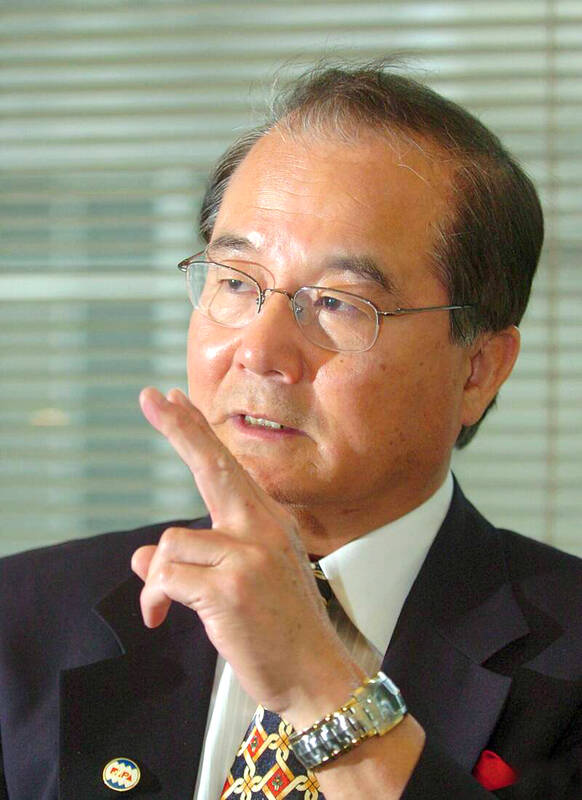C.T. Lee (李青泰), a staunch advocate for Taiwan-US relations and a former Formosan Association for Public Affairs (FAPA) president, passed away on Jan. 9, the Washington-based nonprofit said in a statement on Thursday.
He was 82.
Lee, a Taiwanese-American medical doctor, was FAPA president in 2006 and 2007, “working to reinforce US support for Taiwan and actively promoting the normalization of US-Taiwan relations,” said the organization, which promotes cooperation between Taiwan and the US.

Photo: Taipei Times
FAPA expressed “deep regret” that Lee could not live to see their shared dream — Taiwan gaining universal international recognition and becoming a fully independent and normal country — being fulfilled.
However, “he would be heartened to know that we will carry his torch forward and continue the fight,” FAPA said.
During Lee’s time as the president of Fapa, he “championed Taiwanese people’s rights to self-determination,” the statement said
In a 2007 interview, he highlighted FAPA’s key objective as “normalizing Taiwan-US ties by lifting all restrictions on high-level visits, advocating for Taiwan’s membership in international organizations such as the UN and the WHO, and countering China’s unfounded claims of sovereignty over Taiwan,” it said.
Lee was active as a FAPA member for decades before taking the role of president, tirelessly engaging with Cincinnati-area members of the US Congress and advocating for the causes of “Taiwan independence” and “keeping Taiwan free,” it said.
He garnered the support of legislators, including former US senator Rob Portman, and former US representatives Steve Stivers and Steve Chabot, it said.
Early in 1994, Lee reached out to Chabot, one of “Taiwan’s strongest supporters” in the US House of Representatives, a move “shaping US-Taiwan relations through numerous legislative initiatives over the next three decades,” the statement said.
Chabot and then-US senator Marco Rubio, who is now US secretary of state, introduced the Taiwan Travel Act, which was signed into law in March 2018.
The act facilitates high-level visits between officials of the two nations and promotes bilateral ties.
FAPA said that the act is a historic achievement, opening the way to “numerous congressional initiatives and actions in support of Taiwan.”
Chabot and Rubio also introduced a resolution reaffirming the 1979 Taiwan Relations Act and the 1982 “six assurances” as cornerstones of the relationship between Taipei and Washington, it said.
FAPA, founded in 1982, is one of the oldest grassroots advocacy organizations for Taiwan in the US, its Web site says.

POSITIVE DEVELOPMENT: Japan and the US are expected to hold in-depth discussions on Taiwan-related issues during the meeting next month, Japanese sources said The holding of a Japan-US leaders’ meeting ahead of US President Donald Trump’s visit to China is positive news for Taiwan, former Japan-Taiwan Exchange Association representative Hiroyasu Izumi said yesterday. After the Liberal Democratic Party’s landslide victory in Japan’s House of Representatives election, Japanese Prime Minister Sanae Takaichi is scheduled to visit the US next month, where she is to meet with Trump ahead of the US president’s planned visit to China from March 31 to April 2 for a meeting with Chinese President Xi Jinping (習近平). Japan and the US are expected to hold in-depth discussions on Taiwan-related issues during the

‘LIKE-MINDED PARTNER’: Tako van Popta said it would be inappropriate to delay signing the deal with Taiwan because of China, adding he would promote the issue Canadian senators have stressed Taiwan’s importance for international trade and expressed enthusiasm for ensuring the Taiwan-Canada trade cooperation framework agreement is implemented this year. Representative to Canada Harry Tseng (曾厚仁) in an interview with the Central News Agency (CNA) said he was increasingly uneasy about Ottawa’s delays in signing the agreement, especially as Ottawa has warmed toward Beijing. There are “no negotiations left. Not only [is it] initialed, we have three versions of the text ready: English, French and Mandarin,” Tseng said. “That tells you how close we are to the final signature.” Tseng said that he hoped Canadian Prime Minister Mark Carney

President William Lai (賴清德) yesterday bestowed one of Taiwan’s highest honors on Saint Vincent and the Grenadines (SVG) Ambassador Andrea Clare Bowman in recognition of her contributions to bilateral ties. “By conferring the Order of Brilliant Star with Grand Cordon on Ambassador Bowman today, I want to sincerely thank her, on behalf of the Taiwanese people, for her outstanding contribution to deepening diplomatic ties between Taiwan and SVG,” Lai said at a ceremony held at the Presidential Office in Taipei. He noted that Bowman became SVG’s first ambassador to Taiwan in 2019 and

A man walks past elementary school artworks at the Taipei Lantern Festival in Ximen District yesterday, the first day of the event. The festival is to run from 5pm to 10pm through March 15.